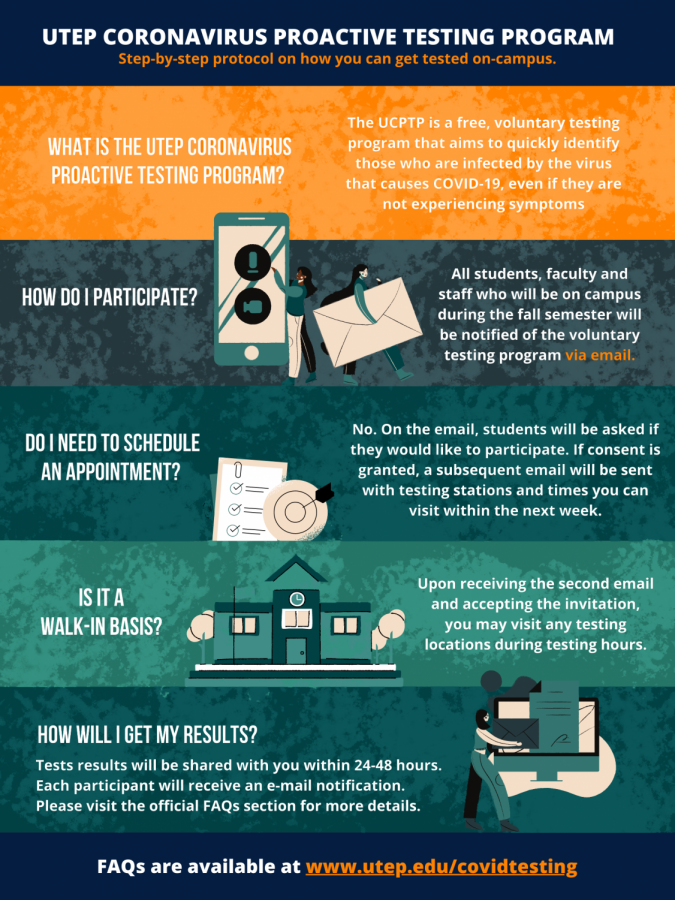The fall semester has officially begun for many colleges across the country and students must now navigate through their college careers amid the coronavirus pandemic.
The University of Texas at El Paso (UTEP) plans to monitor the health and safety of those on campus through the initiation of a free COVID-19 proactive testing program that reported a less than one percent COVID-19 positive rate in its first week.
UTEP’s Coronavirus Testing Program, which was announced by UTEP President Heather Wilson on Aug. 4, is designed to identify asymptomatic individuals who may have the virus and not know it. Testing began a week prior to start of fall classes on Aug. 17, when faculty and staff that are currently on campus or will be on campus during the fall semester were tested.
Apart from student athletes, coronavirus testing is not required for UTEP employees and students, but highly recommended to help limit the spread of the virus within the University.
“The intent of this program is not to diagnose those who are feeling sick, but it’s to identify those who may not have any symptoms and actually be sick,” Wilson said during a virtual news conference held on Aug. 20, alongside Vice President of Student Affairs Gary Edens and Provost and Vice President for Academic Affairs John S. Wiebe.
According to a UTEP news release, COVID-19 testing on campus will continue throughout the fall semester,which will begin on Aug. 24 with five percent of courses being taught face-to-face.. UTEP classes have significantly shifted to digital formats with 75% of classes being taught remotely.
UTEP students, faculty, and staff, were notified via email of the registration process to get tested on campus. This includes completing a one-time consent form with a privacy notice if an individual plans on participating. Once the individual has registered via email, they can report to one of the different testing locations on campus, where they must provide a UTEP identification card, 800 number, or UTEP email address to check in.
The testing program is only available to UTEP students, faculty, and staff who will be on campus during the fall semester.
UTEP received permission from the state to run a licensed and specifically equipped laboratory on campus to test students, faculty, and staff for the coronavirus, with the capacity to test 500 samples during a workday.
The program is funded by federal dollars through the CARES Act and is led by faculty in the border biomedical research center and the biological sciences, public health sciences and mathematics departments. It also involves staff from the Office of Research and Sponsored Projects, Information Technology and University Relations.
According to a news release by UTEP, testing locations will be spread throughout campus and updated weekly on the UTEP COVID-19 proactive testing program website.
“People who are sick should not come on campus and we are emphasizing that in every communication that we have,” Wilson said.
“As of 11 a.m. today, we have results from a total of 809 tests and of those we have a less than one percent positivity rate,” Wiebe said. “We have been able to detect the presence of the virus in several students and a staff member who did not know they were COVID positive because they were asymptomatic.”
The method in which Universities in the United States are releasing its positive cases is a hotbed discussion due to the surge in cases in recently opened college campuses and the guidelines that supplement the release of reported cases.
According to Southern Illinois University’s student news site, Daily Egyptian, the university will not be informing the public of COVID-19 outbreaks on campus and threatened employee’s jobs if they should report positive cases, while other universities such as Western Kentucky University, are more willing to provide positive reported cases and even breaking down data by positive student cases reported by set dates.
Releasing positive university-related cases does not violate Family Education Rights and Privacy Act (FERPA) guidelines if no personally identifiable information is released to the public.
However, FERPA does caution universities to be wary in how they release information about cases and encourages them to do so in a manner that would not allow someone to identify an individual that is COVID-19 positive through circumstantial clues.
UTEP is planning on releasing its positive cases to the City of El Paso and from that point, it is relying on the city to release that data to the public.
“We are connected to the city, so every day we have a positive case we report that data to the city and of course the city reports all of the data for all of El Paso County,” Wilson said.
Results of the COVID-19 samples are analyzed at the UTEP campus and released to the tested individual within 24-48 hours via email. The participating individuals will log into a secure website to access results.
“One of the most important things is to get results back quickly because if you do not feel sick you are not going to self-isolate,” Wilson said. “The sample never leaves the campus and it is evaluated here on campus with the intention to get the results back the next day.”
COVID-19 testing on campus will continue throughout the fall semester.. According to the UTEP Coronavirus Proactive Testing Program website, testing locations are currently open Monday through Friday from 8 p.m. to 2 p.m. at the Fox Fine Arts Complex lower level courtyard and the UTEP Dinner Theater Patio. No appointments are needed, and testing is free.
Isaiah Ramirez may be reached at [email protected] and on Twitter at @_IsaiahRamirez1













